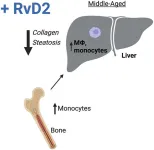(Press-News.org) INDIANAPOLIS – As hospitalizations due to chronic conditions increase across the United States, attention is focusing on using data collected in electronic health records (EHRs) by healthcare systems to enable public health departments to gain understanding of the incidence and prevalence of hypertension, diabetes, asthma, obesity and other chronic diseases with the ultimate goal of improving disease outcomes.
In the U.S., 90 percent of clinicians, medical laboratories, imaging centers and other providers use EHR systems, providing ample data on individuals with access to healthcare. However, access to EHR data by public health departments is limited. Facilitating data sharing with public health departments is complex and requires health data aggregators such as health information exchanges as well as trust among data generators and data users.
A research team including two Regenstrief Institute researchers presents practical guidance for implementing governance for sharing EHR data for chronic disease surveillance based on the experience of the Multi-State EHR-Based Network for Disease Surveillance.
Harnessing the power of health information technology to track infectious diseases has provided vital, in-depth insight to public health departments into infections, hospitalizations, deaths, vaccinations and more during the COVID-19 pandemic.
Unlike infectious diseases, however, there are no legal requirements that chronic diseases be reported to public health departments. Yet if city, county and state public health departments could learn about individuals living with chronic conditions from EHR data via a health information exchange or other data sharing mechanism, they can make a difference in numerous ways according to the Regenstrief Institute’s Center for Biomedical Informatics Interim Director Brian Dixon, PhD, MPA, senior author of the paper.
“With data to identify populations, public health agencies could monitor specific geographic areas for increasing or decreasing numbers of cases of a particular disease and drive people living with chronic conditions to a better quality of life and better disease outcomes,” Dr. Dixon said. “For example, if one part of a city or state has an increasing rate of new cases of diabetes perhaps individuals aren’t getting the education and care they need. Or if in another section of a city or state there is a moderate amount of hypertension but bad outcomes, maybe they're not taking their medications and need support. Public health department budgets are tight, but they can provide services targeted to chronic diseases.
“I think this paper is very important for policymakers and public health leaders because it specifically outlines the processes and policies that we need to enable this kind of work – which doesn’t happen overnight – to occur. Like many things in informatics, the technology exists to aggregate and analyze data on chronic disease. We have the technology to move data from hospital A to a public health department or to aggregate data across multiple years,” said Dr. Dixon. “The barriers are political, legal and organizational. And so, governance and policy are what you use to address and break down those barriers and work within legal parameters to share data. To sustain this activity, we will need to put this kind of governance and these kinds of policies in place to enable EHR-based chronic disease public health surveillance and intervention to occur everywhere in the U.S.”
The current gold standard for chronic disease surveillance is an annual random digit telephone health survey conducted by the U.S. Centers for Disease Control and state health departments. The survey provides reliable metrics about chronic disease on a small but representative sample of the population. However, it takes approximately two years for the data to be available. EHR-based public health surveillance would significantly reduce the delay. Additionally, data would be clinical rather than self-reported.
Dr. Dixon notes that chronic disease surveillance using EHR data requires trust between healthcare systems and public health departments. Building trust, he says, requires robust intentional governance policies and procedures as outlined in the paper.
The Multi-State EHR-Based Network for Disease Surveillance is composed of data contributors and health departments representing Texas, New Orleans, Louisiana, Chicago, Washington and Indiana. The paper reported that the network’s governance approach resulted in a transparent governance framework cultivating trust across the network.
“Fostering Governance and Information Partnerships for Chronic Disease Surveillance: The Multi-State EHR-Based Network for Disease Surveillance” is published in Journal of Public Health Management & Practice.
Regenstrief authors are Dr. Dixon and Shaun Grannis, M.D., M.S., the institute’s vice president for data and analytics.
All authors of the study:
Kraus, Emily McCormick, PhD, MPH; Saintus, Lina, MPH; Martinez, Amanda K., MPH, MSN, R.N.; Brand, Bill, MPH; Begley, Elin, MPH; Merritt, Robert K., M.A.; Hamilton, Andrew, M.S., BSN, R.N.; Rubin, Rick, B.A.; Sullivan, Amy, PhD, MPH; Karras, Bryant Thomas, M.D.; Grannis, Shaun, M.D., M.S.; Brooks, Ian M., PhD; Mui, Joyce Y., B.S., MPM; Carton, Thomas W., PhD, M.S.; Hohman, Katherine H., DrPH, MPH; Klompas, Michael, M.D., MPH; and Dixon, Brian E., PhD, MPA.
Author affiliations as listed in the publication: The Task Force for Global Health, Public Health Informatics Institute, Decatur, Georgia (Dr Kraus, Ms Saintus, and Mr Brand); Kraushold Consulting, Denver, Colorado (Dr Kraus); National Association of Chronic Disease Directors, Decatur, Georgia (Ms Martinez and Dr Hohman); Division for Heart Disease and Stroke Prevention, Centers for Disease Control and Prevention, Atlanta, Georgia (Ms Begley and Mr Merritt); AllianceChicago, Chicago, Illinois (Mr Hamilton); OneHealthPort, Seattle, Washington (Mr Rubin); Washington State Department of Health, Tumwater, Washington (Drs Sullivan and Karras); Center for Biomedical Informatics, Regenstrief Institute, Indianapolis, Indiana (Drs Grannis and Dixon); Indiana University School of Medicine, Indianapolis, Indiana (Dr Grannis); Health Data Compass, University of Colorado Anschutz, Aurora, Colorado (Dr Brooks and Ms Mui); Louisiana Public Health Institute, New Orleans, Louisiana (Dr Carton); Department of Population Medicine, Harvard Medical School and Harvard Pilgrim Health Care Institute, Boston, Massachusetts (Dr Klompas); and Indiana University Fairbanks School of Public Health, Indianapolis, Indiana (Dr Dixon).
The “Improving Chronic Disease Surveillance and Management Through the Use of Electronic Health Records/Health Information Systems” project is supported by the Centers for Disease Control and Prevention (CDC).
About Brian E. Dixon, PhD, MPA
In addition to his role as the director of public health informatics at the Regenstrief Institute and Indiana University Richard M. Fairbanks School of Public Health at IUPUI, Brian E. Dixon, PhD, MPA, is the interim director and a research scientist with the Clem McDonald Center for Biomedical Informatics at Regenstrief Institute and an associate professor of epidemiology at the Indiana University Fairbanks School of Public Health at IUPUI. He is also an affiliate scientist at the U.S. Department of Veterans Affairs Health Services Research and Development Center for Health Information and Communication, Richard L. Roudebush VA Medical Center.
About Regenstrief Institute
Founded in 1969 in Indianapolis, the Regenstrief Institute is a local, national and global leader dedicated to a world where better information empowers people to end disease and realize true health. A key research partner to Indiana University, Regenstrief and its research scientists are responsible for a growing number of major healthcare innovations and studies. Examples range from the development of global health information technology standards that enable the use and interoperability of electronic health records to improving patient-physician communications, to creating models of care that inform clinical practice and improve the lives of patients around the globe.
Sam Regenstrief, a nationally successful entrepreneur from Connersville, Indiana, founded the institute with the goal of making healthcare more efficient and accessible for everyone. His vision continues to guide the institute’s research mission.
About the IU Richard M. Fairbanks School of Public Health
Located on the IUPUI and Fort Wayne campuses, the IU Richard M. Fairbanks School of Public Health is committed to advancing the public’s health and well-being through education, innovation, and leadership. The Fairbanks School of Public Health is known for its expertise in biostatistics, epidemiology, cancer research, community health, global health, health policy, and health services administration.
END
EHR-based public health surveillance for chronic diseases
There are political, legal and organizational barriers to overcome but sharing data with public health could improve chronic disease outcomes
2023-12-06
ELSE PRESS RELEASES FROM THIS DATE:
Tucatinib plus trastuzumab emtansine may benefit patients with advanced or metastatic HER2-positive breast cancer
2023-12-06
SAN ANTONIO – A combination of two HER2-targeted drugs, tucatinib (Tukysa) and trastuzumab emtansine (Kadcyla, T-DM1), extended progression-free survival among patients with unresectable locally advanced or metastatic HER2-positive breast cancer, compared with T-DM1 alone, according to results from the HER2CLIMB-02 trial presented at the San Antonio Breast Cancer Symposium, held December 5-9, 2023.
T-DM1 is an antibody-drug conjugate comprised of trastuzumab (Herceptin) and the cytotoxic drug emtansine. It was approved for use ...
Neoadjuvant chemotherapy may help some breast cancer patients skip regional nodal irradiation
2023-12-06
SAN ANTONIO – For patients whose breast cancer converted from lymph node-positive to lymph node-negative disease after neoadjuvant chemotherapy, skipping adjuvant regional nodal irradiation (RNI) did not increase the risk of disease recurrence or death five years after surgery, according to results from the NRG Oncology/NSABP B-51/RTOG 1304 clinical trial presented at the San Antonio Breast Cancer Symposium, held December 5-9, 2023.
Patients who are diagnosed with breast cancer that has already spread to regional lymph nodes may receive neoadjuvant chemotherapy; in some cases, neoadjuvant therapy completely eradicates ...
Study: diverse college classrooms linked to better STEM learning outcomes for all students
2023-12-06
Washington, December 6, 2023—Students achieve better grades in college science, technology, engineering, and math (STEM) courses when those classrooms have higher numbers of underrepresented racial-minority and first-generation college students, according to new research released today. The findings were published in AERA Open, a peer-reviewed journal of the American Educational Research Association.
While this link holds true for all students, it is even stronger for students who are underrepresented racial minorities (URMs) and the first in their family to attend college. The authors found that in STEM courses ...
Repeated blast exposures may harm the brain health of military personnel
2023-12-06
The brains of special warfare community personnel repeatedly exposed to blasts show increased inflammation and structural changes compared with a control group, potentially increasing the risk of long-term, brain-related disease, according to a new study.
Researchers from the University of Virginia School of Medicine and Naval Medical Research Command (NMRC) led the study, which compared the brains of nine special operations personnel exposed to blasts with a control group of nine military service members with only minimal exposures to blasts. Participants’ brains were analyzed using sophisticated imaging techniques, combined with surveys ...
New findings reveal important insights into age-related nonresolving inflammation
2023-12-06
Philadelphia, December 6, 2023 – Aging is associated with chronic, nonresolving inflammation, or “inflammaging,” that can lead to tissue dysfunction. New findings reported in The American Journal of Pathology, published by Elsevier, reveal insights into the cellular programs and factors that promote the resolution of inflammation during aging. These findings may lead to the development of new strategies to limit age-related organ decline.
The resolution of inflammation is an active process that is governed by numerous factors, such as specialized ...
JAMA Editor in Chief Dr. Kirsten Bibbins-Domingo named one of Modern Healthcare’s 100 Most Influential of 2023
2023-12-06
Kirsten Bibbins-Domingo, Ph.D., M.D., M.A.S.., Editor in Chief of the Journal of the American Medical Association (JAMA) and the JAMA Network™ has been named as one of Modern Healthcare’s 100 Most Influential People in Healthcare 2023 for the second year in a row.
This program acknowledges and honors individuals who are deemed by their peers and the senior editors of Modern Healthcare to be the most influential figures in the industry in terms of leadership and impact.
"It’s an honor to be recognized for two consecutive years by Modern Healthcare," ...
Model uses sociodemographic factors to predict aromatase inhibitor non-adherence risk
2023-12-06
A new risk model uses baseline sociodemographic and financial measures to predict which patients prescribed long-term therapy with aromatase inhibitors for breast cancer are at significantly higher risk of stopping that therapy early (non-adherence).
The work will be presented in a poster spotlight discussion session at the 2023 San Antonio Breast Cancer Symposium (SABCS) on Wednesday, December 6th.
The authors analyzed data from the SWOG S1105 clinical trial, including measures of patient adherence to aromatase inhibitor (AI) therapy for hormone-sensitive breast cancer. They created a model ...
Newly developed floating trash interceptor cleans up the river
2023-12-06
To reduce marine debris, which causes serious environmental pollution in the sea, researchers at the Korea Institute of Civil Engineering and Building Technology (KICT, President Kim, Byung-suk) have developed a technology for reducing floating debris in rivers.
Since the river is the main transportation channels for land-originated marine debris, the research team led by Dr. Sang Hwa Jung launched a living lab project involving local governments, local citizens, and experts.
Chungcheongnam-do (also ...
Morressier and senior leaders from academic publishing form Strategic Advisory Board to stimulate positive change in scholarly communications industry
2023-12-06
Berlin, Germany, and Washington, D.C., December 6, 2023 – Morressier, the company transforming scholarly communications, today announced the formation of a new Strategic Advisory Board composed of the most senior leaders from across the scholarly communications community. The Board, which is facilitated and supported by Morressier, will act as a lively, critical, and direct forum, stimulating innovation and collaboration across the industry on crucial issues such as research integrity and publishing workflows.
The ...
NIH awards $9 million for Indigenous-led Tribal Data Repository to improve community health in response to COVID-19 pandemic
2023-12-06
In an effort to improve the health of Tribal communities and Indigenous people, the National Institutes of Health (NIH) has awarded $9 million in funding for Native scientists at Arizona State University and elsewhere to create the first Indigenous-led Tribal Data Repository.
Since the SARS-CoV-2 worldwide pandemic began, global Indigenous communities have been particularly hard hit, with health disparities including lack of access to health care and undue burden of infections leading to increased hospitalizations and higher death rates.
In response, Indigenous researchers and scientists have been working to secure and fund efforts to better understand the impact of COVID-19 and ...
LAST 30 PRESS RELEASES:
Scientists reveal our best- and worst-case scenarios for a warming Antarctica
Cleaner fish show intelligence typical of mammals
AABNet and partners launch landmark guide on the conservation of African livestock genetic resources and sustainable breeding strategies
Produce hydrogen and oxygen simultaneously from a single atom! Achieve carbon neutrality with an 'All-in-one' single-atom water electrolysis catalyst
Sleep loss linked to higher atrial fibrillation risk in working-age adults
Visible light-driven deracemization of α-aryl ketones synergistically catalyzed by thiophenols and chiral phosphoric acid
Most AI bots lack basic safety disclosures, study finds
How competitive gaming on discord fosters social connections
CU Anschutz School of Medicine receives best ranking in NIH funding in 20 years
Mayo Clinic opens patient information office in Cayman Islands
Phonon lasers unlock ultrabroadband acoustic frequency combs
Babies with an increased likelihood of autism may struggle to settle into deep, restorative sleep, according to a new study from the University of East Anglia.
National Reactor Innovation Center opens Molten Salt Thermophysical Examination Capability at INL
International Progressive MS Alliance awards €6.9 million to three studies researching therapies to address common symptoms of progressive MS
Can your soil’s color predict its health?
Biochar nanomaterials could transform medicine, energy, and climate solutions
Turning waste into power: scientists convert discarded phone batteries and industrial lignin into high-performance sodium battery materials
PhD student maps mysterious upper atmosphere of Uranus for the first time
Idaho National Laboratory to accelerate nuclear energy deployment with NVIDIA AI through the Genesis Mission
Blood test could help guide treatment decisions in germ cell tumors
New ‘scimitar-crested’ Spinosaurus species discovered in the central Sahara
“Cyborg” pancreatic organoids can monitor the maturation of islet cells
Technique to extract concepts from AI models can help steer and monitor model outputs
Study clarifies the cancer genome in domestic cats
Crested Spinosaurus fossil was aquatic, but lived 1,000 kilometers from the Tethys Sea
MULTI-evolve: Rapid evolution of complex multi-mutant proteins
A new method to steer AI output uncovers vulnerabilities and potential improvements
Why some objects in space look like snowmen
Flickering glacial climate may have shaped early human evolution
First AHA/ACC acute pulmonary embolism guideline: prompt diagnosis and treatment are key
[Press-News.org] EHR-based public health surveillance for chronic diseasesThere are political, legal and organizational barriers to overcome but sharing data with public health could improve chronic disease outcomes




